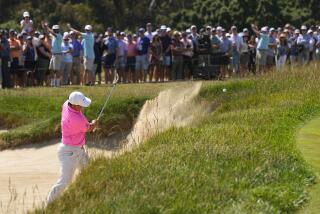Lehman Keeps Coming Back for More After Open Heartaches
- Share via
PINEHURST, N.C. — No matter how short the summers were in Minnesota, Tom Lehman always started them the same way. Camped out on a couch, he watched Lee Trevino and Jack Nicklaus and Johnny Miller winning the U.S. Open.
“I still have vivid memories of them playing the ‘Love’s Theme’ as the intro and Jim McKay’s voice,” Lehman said, his face getting serious as he tries to mimic McKay. “Live, from Winged Foot Country Club in Mamaroneck, N.Y.. . .’
“I can remember missing some Masters, and I can definitely remember missing some PGA Championships and British Opens. But I don’t recall ever missing the U.S. Open.”
Lehman’s love for the U.S. Open is one reason the last four years are impossible to forget.
He can remember virtually every shot in the final round, can pinpoint the most critical mistakes since 1995. Four times, he played in the final group on Sunday in the U.S. Open. Four times, he walked off the 18th green as someone else hoisted the trophy.
But then, Lehman’s love for the U.S. Open is also the reason he’s not afraid to try it again. He will arrive at Pinehurst No. 2 for the 99th Open encouraged by his close calls, not buried by them.
“I played awfully well in each one of those Opens,” he said. “I’m definitely not going to hang my head. Most guys would give [anything] to be in the last group four years in a row. I realize I made some mistakes that have cost me, but I realize that I did some really good things to put me in position.”
Only Bobby Jones in the 1920s has played in the final group four years in a row. The difference is, Lehman has yet to win, although he certainly understands that U.S. Opens are more often lost than won.
And it usually takes only one flinch.
At Shinnecock Hills, it was a drive into the fairway bunker on the par-5 16th, while paired with the master of hard luck, Greg Norman. Unable to hit his second shot down the fairway, Lehman had to aim left and play a fade or aim right and hook it back toward the short grass.
He chose the latter, only it didn’t hook. He had to chip out of the rough to the fairway, then his wedge spun back off the green and he missed a 5-foot bogey putt.
“I hit a bad drive and it cost me a double,” Lehman said. “It cost me the tournament.”
A year later in 1996, he stood on the 18th tee at Oakland Hills tied for the lead with good friend Steve Jones. Driver or 3-wood? Lehman pulled his driver, his confidence club, and belted it down the middle.
His face filled with horror, however, as the ball took one final hard, wicked hop into the edge of the bunker and left him no shot at reaching the green.
“When I hit it, I was pretty happy with it,” Lehman said. “I hit it just the way I wanted to. If I had to do it over again, I’d hit the same shot--just aim further right.”
The most painful may have been 1997 at Congressional, when he was tied with Ernie Els and Colin Montgomerie on the 16th hole and had 7-iron into the green. Lehman decided to play a cut over the corner of the bunker, not his normal ball flight. Four feet left or four feet farther and he is putting for birdie. Instead, the ball disappeared into the rough, Lehman hacked out and took bogey.
That forced him to play catchup in a U.S. Open, which is asking for trouble.
“You make a mistake, and you’re simply going to pay,” Els said.
Needing a birdie to catch Els, Lehman changed his target on the 17th from the middle of the green to a little closer to the flag on the left. He caught his 7-iron a little heavy and turned the ball over, then watched helplessly as it bounced off the left bank and into the water.
“That’s the shot I wish I had over,” Lehman said. “You never know if you’re going to make birdie, but it sure would have been nice to have a chance.”
He didn’t have much of a chance last year at Olympic, starting the final round three strokes back and making a bogey on the easy par-5 first hole. He finished six strokes back of Lee Janzen in a tie for fifth.
One of these years, Lehman will get it right.
He is running out of time, even by his own count. A late bloomer who once played smaller tours around the globe, Lehman turned 40 in March and figures the prime of his career is slipping away faster than so many U.S. Opens have eluded him.
He has not won in America since the 1996 Tour Championship, although the U.S. Open seems to bring out the best in him.
“I love the tournament so much,” Lehman said. “I’m always so excited to play, I have a really good attitude and that’s to my benefit. It’s the tournament I’d like to win more than any other in the world.”
More to Read
Go beyond the scoreboard
Get the latest on L.A.'s teams in the daily Sports Report newsletter.
You may occasionally receive promotional content from the Los Angeles Times.










